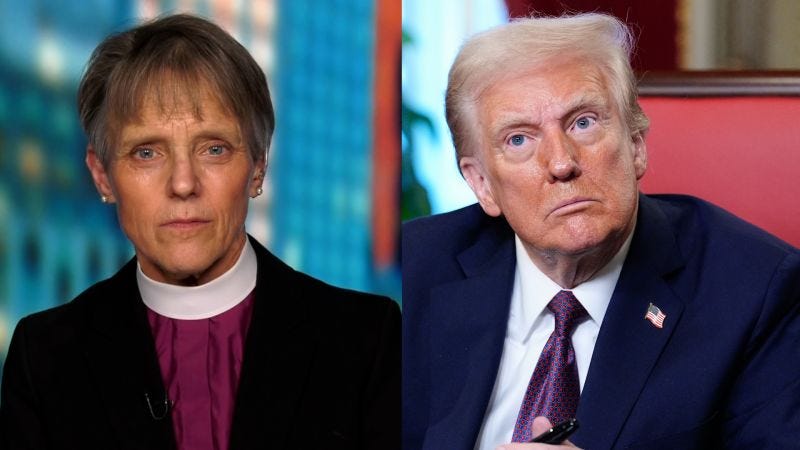The biblical book of Second Samuel contains a shocking dialogue between the prophet Nathan and King David. In it Nathan tells David the story of a rich man who steals a poor man’s most treasured possession.
The rich man, Nathan says, had many sheep and cattle. The poor man had only one small lamb that he loved like a daughter.
But the rich man was receiving a guest for a meal. Unwilling to use one of his own animals, he took the poor man’s lamb and prepared it for the feast. The poor man was left with nothing.
The king is outraged. He declaress that the rich man must repay the poor man four times over for his cruelty.
Nathan then said to him, “You are that man!” Nathan was admonishing the king for his affair with Batsheva and murder of her husband Uriah.
King David and Nathan?
I recalled this story as I read about the Episcopal bishop of Washington, DC. She delivered a sermon at an interfaith service the day after the inauguration, with President Trump and Vice-President Vance in attendance.
You’ve probably seen the video or read the story. The full remarks are here, and I encourage you to read them in their entirety.
Near the end of her remarks, the bishop said,
“Millions have put their trust in you. And as you told the nation yesterday you have felt the providential hand of a loving God. In the name of our God, I ask you to have mercy upon the people in our country. And we're scared now.
There are gay, lesbian and transgender children in Democratic, Republican and independent families -- some who fear for their lives.
And the people, the people who pick our crops and clean our office buildings, who labor in poultry farms and meatpacking plants, who wash the dishes after we eat in restaurants, and work the night shifts in hospitals.
They may not be citizens or have the proper documentation. But the vast majority of immigrants are not criminals. They pay taxes and are good neighbors. They are faithful members of our churches and mosques, synagogues … and temples.
Tbe bishop’s sermon generated passionate support and criticism. Critics say she injected politics into a religious event. They said she had a pre-existing hatred of Donald Trump and conveyed no tact or graciousness at an interfaith event.
Who’s Right?
I try to keep partisan politics out of my sermons and writings, but I think the critics are wrong to lash out, even if they disagree.
If the shoe were on the other foot—if a more conservative pastor delivered a similar type of sermon to a newly-inaugurated liberal president—many of the critics would have been thrilled.
Many of my readers will agree with the Bishop’s perspective. Some will not. But each of us can learn a bit about the unique role clergy can play in our culture. Here’s why I admire what the bishop did:
1. She spoke with clarity and gentleness: Asking for mercy is not a harsh demand. It is humble act of empathy.
She was not asking for a political law or piece of legislation.. She was asking for kindness, for empathy. In Jewish tradition we ask for rachamim, for mercy, for all people. Mercy and kindness is part of what makes us human.
2. She lifted up the human story: You may not share the same concerns as the bishop. But many people do. Highlighting their emotions is part of her job.
A leading American minister of the 1920s said the role of a minister is “comfort the afflicted the afflict the comfortable.” That’s exactly what she was doing.
3. It was real and unscripted: Most of the inauguration is highly choreographed. There are no surprises. Everybody knows what is going to be said.
That makes sense. Millions of people are watching and thousands are participating in a multitude of events. But the real world is not scripted. Everything does not always fall into place.
Sometimes we have to listen to and engage with people we disagree with—even if we are president of the United States. That’s part of the beauty of the Judeo-Christian tradition and of democracy. No one is above admonishment.
Double Duty
In fact, Jewish wisdom suggests leaders have to make an extra effort to listen to those of others. We find this idea near the end of the Torah. The text tells us that after he is anointed, the king of Israel is required to write and have his own copy of the Torah.
This personal scroll, the Jewish sages say, is in addition to the scroll the king was already required to have when he ascended to the throne. In other words, the king has to own two Torah scrolls.
One scroll stayed in the palace. The king used it to study. The other accompanied the king wherever he went. It reminded him he is not above the law. He is bound to it. He is not above his people. He is the people’s—and God’s—servant.





Rabbi, this is so good. Thank you! I'm disheartened (as a Christian) by the anger so many who claim to be people of faith. Bishop Budde spoke gently. She called in her entire message for unity, humility, empathy. She asked Trump to consider the way of mercy. (She was much softer in approach than Nathan!) Despite having manipulated people of faith, Trump appears unfamiliar with what we call 'conviction' about his own shortcomings.
This Jewish woman is very pleased at your comments. However, if I may. The Bishop did not say WE are scared now. She asked for mercy for those WHO are scared now. I knew you'd want to make that correction as being unafraid is a daily challenge and my daily prayer in these times. We sang with purpose when we sang, "We are not afraid x3...we shall overcome some day."